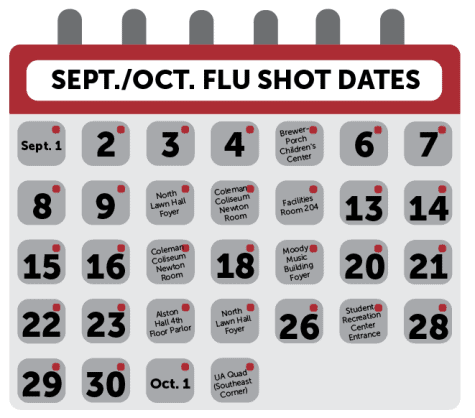University sponsors quick, free flu shots on campus
September 5, 2019
The University of Alabama and WellBama are partnering together to offer free flu shots throughout the months of September to November for all UA students and employees.
Nurses from various UA organizations such as the University Medical Center, University Student Health Center and Capstone College of Nursing will be administering the shots.
Flu shots will be given at the following dates and locations:

The flu shot was initially discovered in the 1930s as a way to prevent influenza spread, with the earliest forms preventing against the influenza A strain. Influenza comes in four strains, with most vaccines being anywhere from 40-60% effective, according to a report by Forbes.
According to the Center for Disease Control and Prevention (CDC), “flu vaccination was even more effective in preventing the most severe forms of flu and reduced the risk of being admitted to an ICU with flu by 82%.”
“I think a lot of people, especially college kids, think that the flu vaccine is a fluke,” said McKenzie Rodgers, a junior majoring in nursing.
Rodgers stressed the importance of getting the flu shot, as she found that many hospitals won’t allow patients into certain units, such as oncology suites, without record of having received a flu vaccine. Luckily for students in a hurry, the process for getting a free flu shot on campus is relatively quick.
“I was in and out within five minutes,” said Emma Givens, a sophomore majoring in nursing who received her flu shot at the Rose Administration Building on Sept. 3.
While it is possible to not be vaccinated and still avoid the flu, Dr. Pamela Payne-Foster, a preventative medicine and public health physician and professor of community medicine and population health, said the shot still matters.
“The flu for those who are healthy is not catastrophic,” Foster said, noting, however, that the flu shot is very important for those who have vulnerable immune systems, including those who have various diseases like cancer, or respiratory issues like asthma.
Foster said this prospect is a result of herd immunity, which is built when a community has a large population vaccinated, thus preventing the spread of disease. Herd immunity can be evidenced through the disappearance of diseases like polio and measles, which are not seen in many communities today.
“For herd immunity, you want the percentage of people vaccinated to be relatively high, probably greater than 90%,” said Foster.
Jenny Williams, a sophomore majoring in athletic training, has seen what happens when others don’t get vaccinated.
“I get the flu shot because I’ve had experiences where I was the only one out of my roommates who got the flu shot and everyone in the house got the flu except for me,” Williams said.
Foster said some fear getting the flu shot, as misconceptions have led people to believe that the shot makes you sick or gives you the flu. This is incorrect, according to the CDC, which reports that “the vaccines either contain inactivated virus, meaning the viruses are no longer infectious, or a particle designed to look like a flu virus to your immune system.”
“You may get some flu-like symptoms like headaches, but generally aspirin or anti-inflammatory meds will help those symptoms,” said Foster.
For more information regarding the flu shot campaign, contact Jennifer Wright via email at [email protected] or by phone at 205-348-8105.
Online Links:
https://www.ua.edu/events/event/121661










